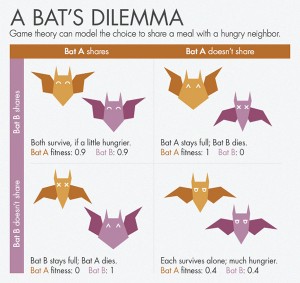Cooperation in Nature
When introducing game theory in lecture, we talked about the Prisoners’ Dilemma Game. In addition to the story where the police are trying to get two criminals to rat each other out, there are many other applications of the Prisoners’ Dilemma Game. One example is in nature: individual organisms have a choice whether to cooperate with its colony/group or defect and act selfishly. In the diagram below, a bat has the choice of either sharing the food that it caught with other bats in the group that did not catch any food or not catching any food to share. In this game, both players do not want to share their food if the other player does not bother to catch any food to share and just steals all the food. Ideally, both bats capture food to share, and in the worse case scenario, both bats don’t catch any food and are starved.
As we learned in class, the optimal outcome of the Prisoners’ Dilemma Game is for both players to defect. However, in nature, there are many examples of cooperation. One example is that some marine microorganisms need to produce molecules that help them gather iron. However, organisms can also take these molecules from their neighbors. Therefore, the microorganism has to choice whether to cooperate and make the molecule or defect and exploit its neighbors’ molecules.
This article talked about two differing views about cooperation over a long period of time. Press and Dyson described a defecting strategy, where one player can defect occasionally but not often enough for the other player to stop cooperating. Meanwhile, Plotkin and Stewart described a strategy of generosity, where even if the opponent defects, the player will still cooperate with a probability in an attempt to get the opponent to cooperate again.
This article found that the defecting strategy works well with one opponent, but in a larger population, a defector will eventually match up with another defector, and both will get a very poor payoff. Therefore, in large populations, the generosity strategy is actually better.
As seen in this video, when an experiment was conducted where individuals went head-to-head with other individuals in the population. The “winner” in each encounter gets more offspring that have the same strategy as the parent. Ultimately, the whole population converts from a defection strategy to a cooperation strategy. This is why we still observe cooperation in nature today.
http://www.scientificamerican.com/article/game-theory-calls-cooperation-into-question1/

